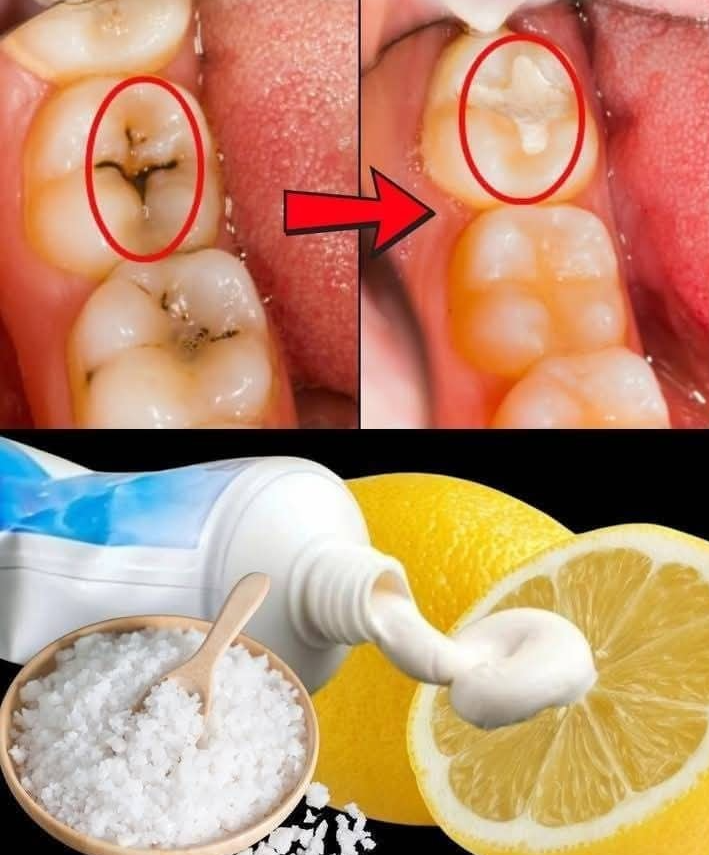Your teeth are part of your body — and like any tissue, they need proper nutrition to stay healthy and rebuild.
Foods to include:
-
Calcium-rich foods (leafy greens, almonds, sesame seeds, fortified plant milk)
-
Vitamin D sources (sunlight, mushrooms, fortified foods)
-
Phosphorus-rich foods (lentils, pumpkin seeds, quinoa)
-
Healthy fats (avocados, coconut oil, omega-3s)
Avoid:
-
Refined sugar and high-carb snacks
-
Soda and acidic drinks
-
Sticky, sugary foods that cling to teeth
Tip: Eat crunchy raw veggies like carrots and apples to naturally clean teeth and stimulate saliva production.
 2. Oil Pulling
2. Oil Pulling
An ancient Ayurvedic practice, oil pulling helps reduce harmful bacteria and support oral health.
How to do it:
-
Swish 1 tablespoon of coconut oil in your mouth for 10–20 minutes.
-
Spit it out (never swallow), rinse with warm water, and brush as usual.
-
Repeat daily, preferably in the morning.
Coconut oil is antimicrobial and may help reduce plaque, one of the key culprits behind tooth decay.
 3. Use Remineralizing Toothpaste or Powder
3. Use Remineralizing Toothpaste or Powder
Commercial toothpaste often contains fluoride, but you can opt for natural remineralizing pastes with:
-
Calcium carbonate
-
Bentonite clay
-
Xylitol (natural sugar that fights decay)
-
Baking soda (balances oral pH)
-
Essential oils (clove, tea tree, peppermint)
DIY: Mix coconut oil, baking soda, calcium powder, and peppermint oil into a paste for a natural alternative.
 4. Boost Saliva Production
4. Boost Saliva Production
Saliva is your body’s natural defense against cavities. It neutralizes acids and provides minerals to the enamel.
To stimulate saliva:
-
Chew sugar-free gum with xylitol
-
Stay hydrated throughout the day
-
Suck on licorice root or ginger slices
-
Avoid mouth breathing
 5. Supplement Smartly
5. Supplement Smartly
Consider supplements that directly support oral health:
-
Vitamin D3 – helps absorb calcium
-
Vitamin K2 – directs calcium to teeth and bones
-
Magnesium – important for enamel structure
-
Cod liver oil – rich in vitamins A and D
Always consult a healthcare provider before starting supplements, especially if you’re on medication.
 6. Use Natural Antibacterial Mouth Rinses
6. Use Natural Antibacterial Mouth Rinses
Instead of alcohol-based rinses, try:
-
Saltwater rinse (½ tsp salt in warm water)
-
Green tea (contains catechins that fight bacteria)
-
Clove water or tea tree oil (few drops in water)
-
Aloe vera juice (swish 30 seconds daily)
Can a Cavity Be Fully Healed Without a Dentist?
If caught early enough, a cavity can remineralize — meaning the enamel is restored and decay doesn’t progress. However:
-
Once the cavity breaks through the enamel into the dentin, natural healing is limited.
-
Severe decay requires professional treatment.
-
Regular dental checkups are still essential to monitor progress.
Preventing Future Cavities Naturally
-
Brush twice daily with a soft-bristle brush
-
Floss every night
-
Avoid snacking frequently between meals
-
Replace sugary drinks with water or herbal teas
-
Limit acidic foods (citrus, vinegar) that weaken enamel
Pro tip: Finish acidic meals with a small piece of cheese or rinse with water to neutralize acids.
Conclusion
Repairing a cavity naturally isn’t magic — it’s about supporting your body’s ability to heal, avoiding harmful habits, and being consistent with natural care. While not all cavities can be reversed, many early-stage lesions can be halted and even repaired if you act fast and adopt a mineral-rich, tooth-friendly lifestyle.
Your smile is worth it — and your body is more capable than you think.
